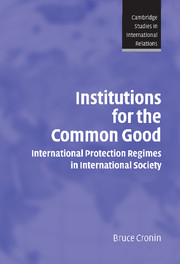Book contents
- Frontmatter
- Contents
- Acknowledgments
- 1 Introduction: international relations theory and the common good
- 2 International protection regimes in an international order
- 3 The national state and the protection of ethnic minorities
- 4 The liberal state and the protection of European citizens
- 5 The multicultural state and the protection of ethnic communities
- 6 The nation-state and the protection of refugees
- 7 Conclusion
- Bibliography
- Index
- CAMBRIDGE STUDIES IN INTERNATIONAL RELATIONS
1 - Introduction: international relations theory and the common good
Published online by Cambridge University Press: 22 September 2009
- Frontmatter
- Contents
- Acknowledgments
- 1 Introduction: international relations theory and the common good
- 2 International protection regimes in an international order
- 3 The national state and the protection of ethnic minorities
- 4 The liberal state and the protection of European citizens
- 5 The multicultural state and the protection of ethnic communities
- 6 The nation-state and the protection of refugees
- 7 Conclusion
- Bibliography
- Index
- CAMBRIDGE STUDIES IN INTERNATIONAL RELATIONS
Summary
The protection of foreign populations by collectivities of states is both an anomaly and an enduring practice in international relations. It is an anomaly because in a system of sovereign states, each state is not only the final judge of its own interests, it is also required to provide the means to attain them. Most political leaders recognize that their primary responsibility is toward their own citizens, and they tend to pursue this with extreme prejudice. Protecting groups and individuals within other states traps foreign policy officials into diverting resources from their own security needs without providing a significant domestic political benefit. Thus, the welfare of foreign populations falls well outside traditional definitions of state interest. Moreover, the institution of sovereignty is supposed to limit the jurisdiction of international organizations to regulating the relations between states, not within them. This has long been maintained through norms of coexistence, diplomatic practice, and international law, all of which are largely designed to shield states from interference in their internal affairs by outside powers.
Yet international protection is also an enduring practice in diplomatic history. Since the evolution of the nation-state system in the sixteenth and seventeenth centuries, collectivities of states have alternately sought to protect religious minorities, dynastic families, national minorities, ethnic communities, individual citizens, and refugees. This practice has not been random. Rather, during particular eras certain classes of people have been specifically singled out for protection while others have been consciously ignored.
- Type
- Chapter
- Information
- Institutions for the Common GoodInternational Protection Regimes in International Society, pp. 1 - 32Publisher: Cambridge University PressPrint publication year: 2003



